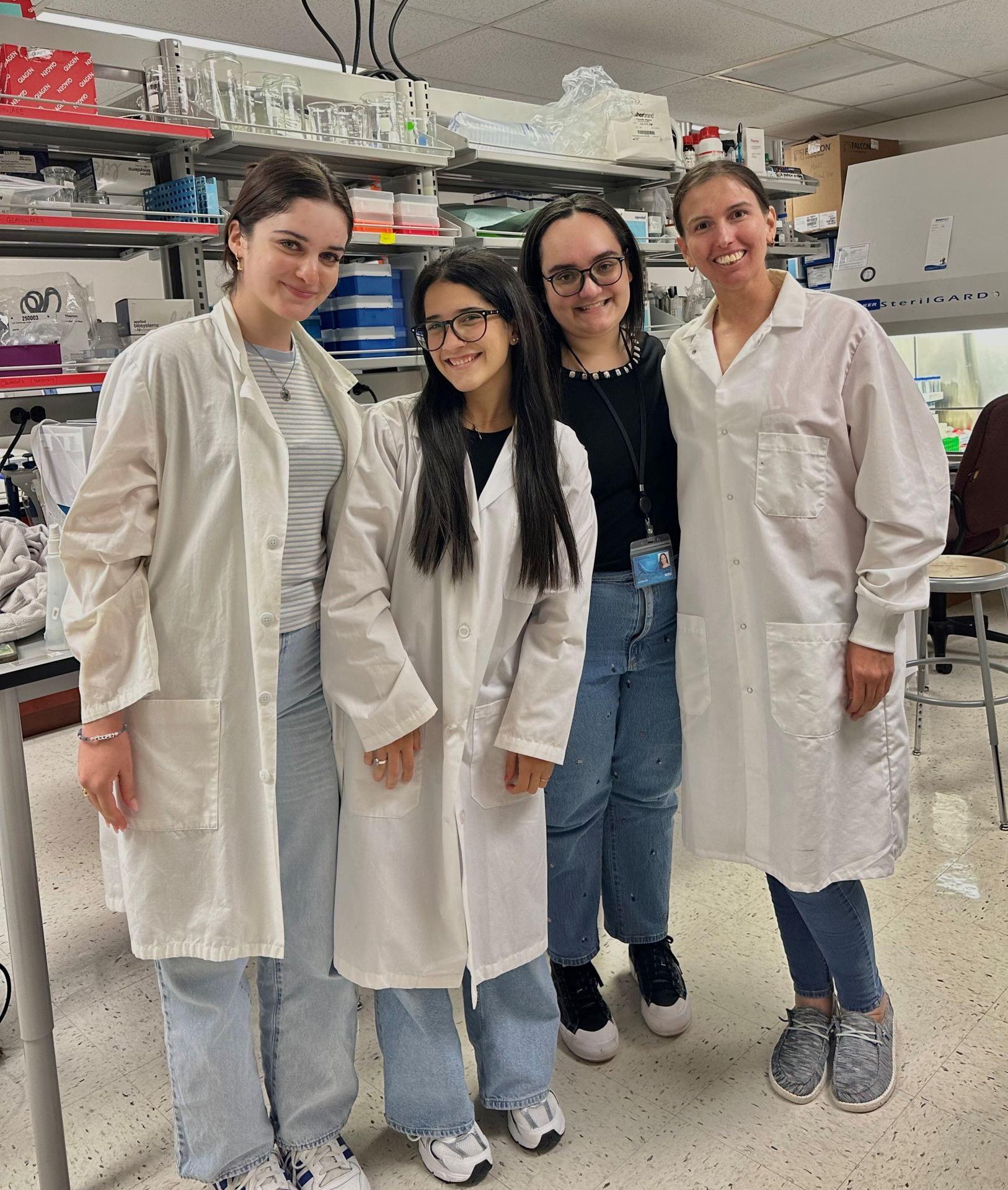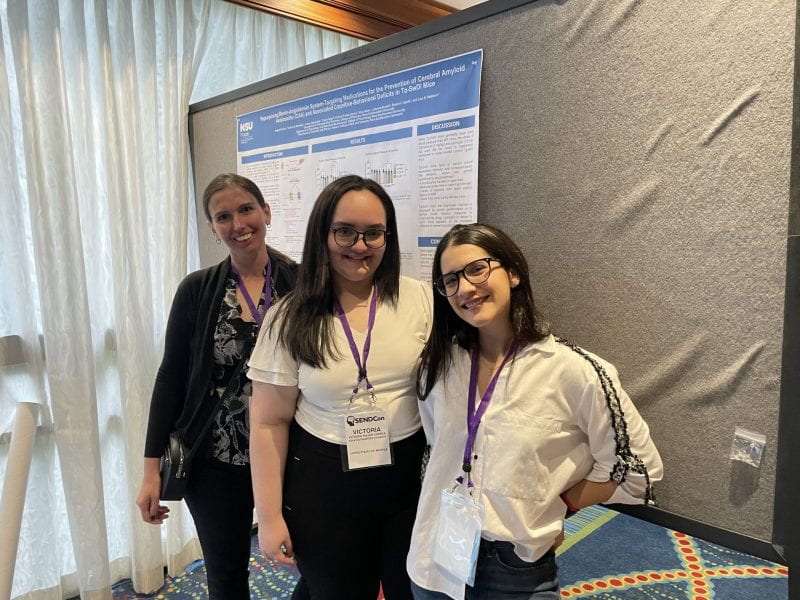Spotlight on a Researcher – Lisa Robison, PhD (College of Psychology)


Lisa S Robison, Ph.D. is an Assistant Professor of Neuroscience in the Department of Psychology and Neuroscience at Nova Southeastern University (NSU). Dr. Robison received her B.A. in Molecular Biology from Colgate University in Hamilton, New York, after which she got her M.A. in Psychology and PhD in Integrative Neuroscience from Stony Brook University, where she completed her dissertation in the labs of Drs. John Robinson and William Van Nostrand. Following her PhD, she served as an Instructor and Postdoctoral Research Scientist in the Department of Neuroscience and Experimental Therapeutics at Albany Medical College in Albany, NY, where she worked in the lab of Dr. Kristen Zuloaga. During her time as a Postdoctoral Researcher, Dr. Robison also served as a Lecturer in the Department of Psychology at University at Albany – State University of New York. Following her Postdoc, she served as Visiting Assistant Professor in the Department of Psychology at Stetson University in DeLand, Florida for one year prior to joining the faculty at NSU in 2021.
Research in Dr. Robison’s lab at NSU is primarily focused on understanding and developing therapies for neuropsychiatric and neurodegenerative diseases. One key area of her research involves determining how general health of the human brain is influenced by lifestyle factors, and how these factors influence diseases with a neurobiological basis. Currently, there is a lack of effective treatments for various neurological disorders such as addiction, mood disorders (anxiety, depression), and dementia. Dr. Robison’s lab is interested in determining whether lifestyle factors influencing these disorders can be modified to prevent, delay, or treat these neurological ailments. In addition to investigating risk factors and their influence on brain diseases, her lab also conducts research aimed at repurposing currently approved medications for the treatment of dementia, in collaboration with several colleagues in NSU’s College of Pharmacy.

Dr. Robison with students. From left to right: Chana Vogel, Ariana Hernandez, Victoria Pulido-Correa, and Dr. Lisa Robison
Researchers in Dr. Robison’s lab are currently investigating the possible role of modifiable lifestyle factors, such as diet, in mouse models of aging and dementia. As a part of this research, she is also trying to understand how different sexes are affected by a high fat diet and resulting metabolic diseases (obesity, diabetes). Results from her postdoctoral research published in multiple scientific journals including the Journal of Neuroinflammation in 2022 (https://www.ncbi.nlm.nih.gov/pmc/articles/PMC9107741/) show high fat diet and metabolic disease preferentially affect females. Additionally, females tend to exhibit greater susceptibility to dementia pathology, exacerbated by high fat diet/metabolic disease, which may contribute to the increased risk of dementia in women, particularly in the presence of comorbid metabolic disease. Dr. Robison’s research also provided evidence showing that high fat diet impaired adult hippocampal neurogenesis (a process that supports learning and memory) in females only, and sex-dependently alters microglia in the hippocampus (Robison et al., 2020, eNeuro https://www.ncbi.nlm.nih.gov/pmc/articles/PMC6946541/ ). Ongoing work in Dr. Robison’s lab is exploring whether cardiovascular medications may be repurposed to protect the brain against the adverse effects of a high fat diet and resulting metabolic disease. Additionally, her lab is investigating the potential sex-dependent effects of a ketogenic diet (high fat, very low carbohydrate) in mouse models of healthy aging and dementia.
Although cognitive impairment and associated brain regions have been most widely studied, there are numerous non-cognitive symptoms and associated areas of the brain that are commonly affected in Alzheimer’s disease. One such brain area affected is the hypothalamus, which helps maintain the body’s internal balance, including the regulation of feeding behavior, metabolism, and maintenance of body weight. Findings from Dr. Robison’s research using a mouse model of Alzheimer’s disease (3xTg-AD mouse) on control low fat and high fat diets showed marked sex differences in metabolic outcomes. Male Alzheimer’s mice on control low fat diet appeared to represent an energy deficit state (attenuated body weight and adiposity, hypoleptinemia), not associated with reduced caloric intake, increased activity levels, nor improper balance of hypothalamic expression of hormones that regulate feeding and metabolism; instead, these metabolic outcomes were seemingly linked to high-grade systemic and hypothalamic inflammation. Conversely, female Alzheimer’s mice appeared to represent an energy surplus state, which was exacerbated by high fat diet. Female 3xTg-AD mice on the high fat diet had the greatest weight gain, adiposity, and glucose intolerance, as well as hyperleptinemia; these outcomes were associated with severe increases in reactive astrocytes in the hypothalamus. In contrast, males on the same diet had increased diabetes markers and systemic inflammation, but hypothalamic inflammation was not further augmented. (Robison et al., 2020, Journal of Neuroinflammation https://www.ncbi.nlm.nih.gov/pmc/articles/PMC7526387/). Dr. Robison recently published a collaboration with Dr. Kristen Zuloaga’s lab (Albany Medical College, NY) further investigating these findings in a cross-sectional aging study in the 3xTg-AD mouse model of Alzheimer’s disease (Robison et al., 2023, Biology of Sex Differences https://www.ncbi.nlm.nih.gov/pmc/articles/PMC10410820/).

Top from left to right: Dr. Benedict Albensi (Professor and Chair of NSU Dept of Pharmeceutical Sciences), Dr. Mayur Parmur (Assistant Professor of Pharmacology – NSU Tampa/Clearwater Campus), Dr. Robert Speth (Professor, NSU Dept of Pharmeceutical Sciences). Bottom (seated) from left to right: Dr. Mohammad Sabbir (Assistant Professor, NSU Neuroscience), Dr. Lisa Robison (Assistant Professor, NSU Neuroscience), Victoria Pulido-Correa, Ariana Hernandez.
One of the diseases Dr. Robison’s lab is currently working on is cerebral amyloid angiopathy (CAA), characterized by accumulation of toxic protein around the blood vessels in the brain, damaging the vessels and altering blood flow. CAA on its own can cause vascular dementia and increases the risk of stroke. Additionally, CAA is highly comorbid with Alzheimer’s disease, as they are both associated with the accumulation of the beta-amyloid protein (as plaques in Alzheimer’s and within the cerebral blood vessels in CAA). As there are currently no known treatments for CAA, Dr. Robison is investigating the effects of modifiable lifestyle factors on CAA, as well as the efficacy of several repurposed medications. One of the intervention strategies that has been shown to offer protection against dementia in experimental mouse models is physical exercise. Dr. Robison’s research using wild-type mice and two different mouse models of dementia, including a model of CAA, demonstrated that varying the length of daily access to a running wheel results in dose-dependent effects of long-term voluntary wheel running on physiology, cognition/behavior, and neurobiology/pathology. (Robison et al., 2019, J. Neuroinflammation; Robison et al., Physiol. Behav.; Francis, Robison et al., 2020, J. Alzheimers Dis.). She also investigated the influence of environmental enrichment in mouse models of healthy aging and CAA. Results from her research reported in scientific publications show that these lifestyle factors had additive beneficial effects, which was in line with clinical findings (Robison et al., 2020, Int. J. Mol. Sci. https://www.ncbi.nlm.nih.gov/pmc/articles/PMC7038188/). Dr. Robison has received a grant award from the American Heart Association for her ongoing work in this area and is conducting this research at NSU in collaboration with Dr. Robert Speth (NSU College of Pharmacy). Together, they will be investigating the possibility of repurposing certain cardiovascular medications to prevent and/or treat CAA and associated cognitive decline. Dr. Robison also received a grant award from the National Institute on Aging to investigate whether repeated mild traumatic brain injuries, such as those sustained during sports, military activity, or as a result of intimate partner violence, increases the risk of dementia in later life by influencing CAA and related pathologies. This project is in collaboration with NSU faculty, Dr. Benedict Albensi (College of Pharmacy) and Dr. William Kochen (College of Psychology).
In addition to studying the effect of physical exercise on neuropathologies such as Alzheimer’s disease and CAA, Dr. Robison is interested in understanding how exercise influences drug-seeking behavior and reward-related neurobiology. Previous clinical studies, as well research in animal models, have revealed that physical exercise offers protection against the initiation, escalation, extinction, and relapse of substance use of several drug classes and has the potential to be used for combating substance use disorders. Dr. Robison’s research in this area demonstrated that six weeks of treadmill running decreased cocaine-seeking behavior in rats, and that this effect was greater in males than in females (Thanos et al., 2010, Behav. Brain Res.). She also found that exercise reduced relapse to cocaine seeking behavior triggered by environmental cues and stress (Robison et al., 2018, Behav. Brain Res), and that physical exercise altered dopamine receptor levels in reward-related brain regions of both sexes which may reduce susceptibility to drug abuse (Robison et al., 2018, Med. Sci. Sports Exerc.). Findings of her research showing that fairly small amounts of moderate-intensity exercise may prevent and treat substance abuse was featured in various news outlets including U.S. News & World Report . Currently, Dr. Robison’s lab has received research funding from NSU Farquhar Honors College for investigating the efficacy of chronic forced exercise (treadmill running) for the amelioration of brain and behavior changes caused by adolescent binge-drinking.
Dr. Robison’s research in the fields of neuroscience and neurobiological diseases has resulted in multiple peer-reviewed publications and grant awards from various funding agencies. In addition to serving the NSU community as a researcher and educator, she also serves as a member of the university’s Institutional Animal Care & Use Committee (IACUC), which is responsible for reviewing protocols involving the use of animal models to ensure ethical treatment of animals used for research and teaching. Dr. Robison has also been involved with scientific education and outreach among local high school students in south Florida. As a part of her efforts, each year she organizes the “Brain Bee” competition for students from ~8-10 local high schools. This event is a spelling-bee style science competition that includes a high school student poster competition, as well as lab demonstrations and research talks by NSU faculty from the Department of Psychology and Neuroscience and the College of Pharmacy. NSU undergraduate and graduate students participate as volunteers and get an opportunity to present posters on their research. This event is sponsored by NSU’s College of Psychology and in 2022, Dr. Robison along with Dr. Leanne Boucher received a grant award from the Dana Foundation to support this event.

Dr. Robison’s lab presenting a poster at the 2023 Southeastern Neurodegenerative Diseases Conference in Atlanta, GA. From left to right: Dr. Robison, Victoria Pulido-Correa (undergraduate, NSU Neuroscience), Ariana Hernandez (undergraduate, NSU Neuroscience).
Dr. Robison’s research in neuroscience has the potential to influence the lives of millions of people suffering from various neurobiological disorders. Her dedication to research and her passion for educating students ensures that she will continue to make important scientific discoveries in the field of neuroscience as well as serve as valuable member of the NSU community.